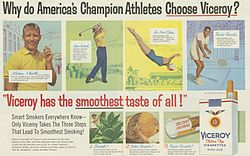Viceroy Cigarettes
Viceroy Cigarettes: A Classic American Brand

Image Source: Pexels

Introduction
Firstly, Viceroy cigarettes have a rich history and are known as a classic American brand. Introduced by Brown & Williamson in 1936, Viceroy was the world’s first cork-tipped filter cigarette. It quickly gained popularity as a mid-priced brand, positioned between B&W’s Raleigh flagship brand and the more affordable Wings cigarettes. Over the years, Viceroy has undergone various changes and developments, including the introduction of a cellulose acetate filter in 1952 and the launch of Viceroy Filter Kings in 1953. Let’s explore the fascinating history, advertising campaigns, controversies, and market presence of Viceroy cigarettes.
History of Viceroy
Secondly, Viceroy’s journey began in 1936 when Brown & Williamson introduced it to the market. As the world’s first cork-tipped filter cigarette, Viceroy offered a unique smoking experience. It was positioned as a mid-priced brand, priced higher than Wings cigarettes but more affordable than B&W’s flagship brand, Raleigh. In 1952, Viceroy made another significant breakthrough by introducing a cellulose acetate filter, setting a new industry standard. This innovation paved the way for a more enjoyable smoking experience for consumers. The following year, in 1953, Viceroy Filter Kings were introduced, further solidifying the brand’s reputation.
Thirdly, Throughout the years, Viceroy continued to evolve and adapt to changing consumer preferences. In 1979, the brand launched a low-tar version called Rich Lights, catering to health-conscious smokers. In the 1990s, Viceroy introduced new box styles and expanded its product range with Viceroy Box Kings, Lights Box Kings, Ultra Lights Kings, and Ultra Lights 100’s. In 2000, Viceroy Menthol was introduced, providing smokers with a refreshing alternative.
Advertising Campaigns
Fourthly, Viceroy has had a rich history of advertising campaigns, both in print and on television. Brown & Williamson created various posters and magazine advertisements to promote the brand, capturing the attention of consumers. One notable advertising campaign emphasized the health benefits of Viceroy cigarettes due to their filter-tipped design. The slogan “As your dentist, I would recommend Viceroys” was used in the 1940s to highlight the brand’s commitment to providing a healthier smoking option.
Furthermore, In the 1970s, Brown & Williamson recognized that Viceroy was primarily popular among women and couples. To appeal to a broader audience, the company sponsored the Vel’s Parnelli Jones Racing team in autosport championships. This move aimed to give the brand a more masculine image, similar to the popular Marlboro cigarettes. The partnership with Vel’s Parnelli Jones Racing helped Viceroy establish a stronger presence in the racing community and attract new consumers.
In addition, Viceroy also ventured into unique collaborations to promote its brand. In 1974, the brand partnered with TAG Heuer, a renowned watch manufacturer, to produce a special version of the Autavia watch called the “Viceroy.” This collaboration allowed Viceroy to tap into the luxury market and appeal to consumers who valued both style and quality.
Controversies Surrounding Viceroy
Finally, Like many cigarette brands, Viceroy has faced its share of controversies. One notable controversy involved a marketing test proposed by Brown & Williamson in the 1970s to determine whether children could be encouraged to become smokers. The Federal Trade Commission discovered this test during an investigation into cigarette company advertising practices. However, the Viceroy ad campaign targeting children was not carried out.
Moreover, Another controversy arose in 1994 when it was revealed that B&W had been growing genetically modified tobacco plants in South America. These plants were engineered to produce higher levels of nicotine, leading to concerns about the addictive nature of Viceroy cigarettes. The U.S. Food and Drug Administration Commissioner, David Aaron Kessler, raised awareness about this issue, specifically mentioning Viceroy King Size and Viceroy Lights King Size cigarettes as containing genetically modified tobacco known as Y-1.
Lastly, In 1995, former B&W vice president Jeffrey Wigand, a research chemist, exposed the company’s practice of adding chemicals to increase smokers’ addiction to nicotine. This revelation shed light on the manipulation of cigarette ingredients and raised public health concerns.
Viceroy in Popular Culture
Viceroy cigarettes have made appearances in various forms of popular culture. In the classic film “12 Angry Men,” a pack of Viceroy cigarettes is seen on the table in front of juror number 8, played by Henry Fonda. This subtle inclusion reflects the brand’s presence in society at the time.
Additionally, Canadian singer-songwriter Mac DeMarco paid tribute to his favorite brand of cigarettes with a song called “Ode to Viceroy.” The song, featured on his album “2,” became a fan favorite and showcased the enduring influence of Viceroy in popular culture.
Viceroy’s Global Presence
Viceroy cigarettes have enjoyed a global presence, being sold in various countries worldwide. Apart from the United States and Canada, Viceroy has made its mark in countries such as Mexico, Honduras, the Dominican Republic, Costa Rica, Chile, Argentina, the United Kingdom, Finland, Spain, Poland, Hungary, the Czech Republic, Romania, Bulgaria, Turkey, Belarus, Russia, Georgia, Azerbaijan, Uzbekistan, Egypt, Israel, Thailand, Hong Kong, Lebanon, Jordan, Singapore, and Venezuela. This extensive market reach highlights the brand’s international appeal and enduring popularity.
Conclusion
Viceroy cigarettes have stood the test of time as a classic American brand. From its introduction as the world’s first cork-tipped filter cigarette to its innovative advertising campaigns and global presence, Viceroy has left an indelible mark on the tobacco industry. Despite controversies and changing consumer preferences, the brand continues to appeal to a wide range of smokers worldwide. As the legacy of Viceroy persists, its rich history and iconic status remain an integral part of the cigarette industry.
Page 3 of 16